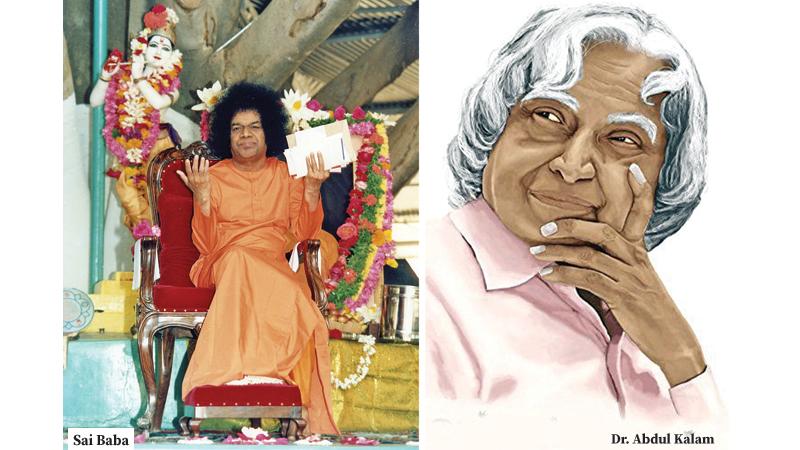
Science and spirituality usually do not go together. Science is the systematic study of the structure and behaviour of the physical world, especially watching, measuring and doing experiments and the development of theories to describe the results of these activities.
Spirituality, on the other hand, is the quality of involving deep, often religious feelings and beliefs, rather than the physical parts of life. As a result, scientists and spiritualists hardly meet to discuss their theories. However, the meeting of minds of Abdul Kalam, an eminent aero-space scientist and Sathya Sai Baba, a well-known spiritualist, appears to be a rare phenomenon.
In one of his discourses Sai Baba said, “What is the reason for the lack of peace in the world today? It is because there is no harmony in thought, word and deed in the family. When there is understanding and harmony in the family,there will be harmony in the community and then the world. Unity is the primary need today.
Unity confers joy and peace. Transformation must begin with the individual, when the individual changes the world will change. This transformation has to take place in the minds of men. Right thoughts will lead to right actions. That is why the scriptures have declared that the mind is the cause of man’s bondage.
The thought vibrations are the cause for man’s joy and sorrow, health and disease, woe and weal and birth and death. Man’s life becomes meaningful if he conducts himself fully aware of the thought vibrations. Hence it is necessary to direct our thoughts on noble paths. In fact, the mind alone is the cause of all things.”
Space scientist and former President of India, in an article published in a leading newspaper said, “I admire Sathya Sai Baba’s words of wisdom and selfless service.” Kalam who hailed from Tamil Nadu studied physics and aero-space engineering. After graduation, he spent four decades as a rocket scientist at the Defence Research and Development Organization and the Indian Space Research Organization (ISRO).
He was closely involved in India’s civilian space program and military missile development. He also served as the chief scientific adviser to the Prime Minister and as Secretary of the Defence Research Development Organization.
Cultural traditions
Kalam was a practising Sunni Muslim. His father impressed upon him the value of interfaith respect and dialogue. His legacy is the multiculturalism embodied in various elements of the spiritual and cultural traditions of India.
He was well-versed in Hindu traditions. He learnt Sanskrit and studied the Bhagavadgita and remained a vegetarian. He enjoyed writing Tamil poetry and played the Veena as a hobby. He loved listening to Carnatic music and translated the Thirukkural into English.
Kalam was highly impressed by Sai Baba’s discourse when he said, “What are the reasons for the treacherous, cruel acts in the world. They show the decline of selfless service, the increase of meaningless feelings and the multiplication of senseless desires. Following the path of birds that fly in the sky with the help of their wings make love and service your winds and fly in the sky. Selfless service will encourage man to reach a higher state of humanity. Selfless service alone gives the needed strength and courage to awaken the sleeping humanity in man. Duty alone will not be enough for the progress of humanity. You need kindness, compassion, morality and forgiveness. Without such qualities man cannot perform any selfless service.”
Kalam said, “Can there be a better role model than Sai Baba for promoting a nationwide selfless and social transformation?” Kalam was no stranger to Sai Baba’s mission and miracles. When he was the director of the ISRO, he was struggling to develop a powerful cryogenic rocket engine. The engine he devised failed six times in a row. While testing it for the seventh time he went into a meditative state. Then he heard a voice emanating from nowhere. Then a list of logarithm charts started appearing in his mind. Kalam realised that someone had pointed out to him the faults which he had not noticed. The faults were attended to and the testing was done successfully.
President of India
When the time came for him to retire from ISRO, his employer recommended one year’s extension. However, for some unknown reason, Prime Minister Vajpayee did not approve the extension. A few days later, Vajpayee recommended him for the post of President of India. He became the President of India in 2002 with the support of the ruling and opposition parties.
Kalam became a Sai Baba devotee and donated the first two months’ salary to Sai Baba’s ashram. In his book ‘Transcendence’ published by Harper Collins Kalam says, “As expressed by pre-eminent thinkers and scientists such as Pythagoras, Galileo Galilei, Albert Einstein, Gregor Mendel, Baruch Spinoza, Srinivas Ramanujan, Jagdish Chandra Bose, Subrahmanyan Chandrasekhar and Francis Collins, there is a fusion between science and spirituality. Sai Baba and Abdul Kalam had the same goal to serve humanity selflessly one through the means of spirituality and the other through science.
The write is a freelance journalist and Indologist based in Hyderabad, India
